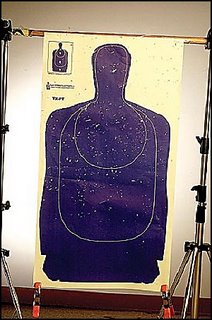David Brooks, "Remaking The Epic Of America", Sunday, February 5:
On this, our holiest day of the year, when Americans gather, overeat and enjoy the outpourings of our greatest advertising agencies, it is fitting to reflect upon the core myth that animates our nation. No, I don't mean the western, which is so 19th century. I mean the sports movie, the epic that defines contemporary America.
Okay, I know what you're thinking: Riley, this post has already written itself. Just give him the Golden Knob of the Week or something and be done with it. Fair enough, but just play along for one more paragraph:
Over the past several years, theaters have been inundated by a series of films that all have the same plot. Whether it is "Hoosiers," "Glory Road," "Coach Carter," "Remember the Titans," "Miracle," "The Replacements" or a hundred others you've barely heard of, the core elements are always the same. A tough, no-nonsense coach, usually with a shadow-filled past, takes over a shambolic, underfunded team. He forces his players to work harder than they ever thought they could. He inspires them to sacrifice for the greater good. Finally, he leads them to glory over richer and more respected rivals.
Even granting Brooks the only escape path Sanity Herself has available here--that he's speaking with tongue planted firmly in cheek (he ain't)--how are you supposed to look at that list without laughing in his face (you aren't)?
Hoosiers may be about as good as that sort of movie can get. It's also twenty years old, which places it about two generations ago in cultural terms. Of the rest, well,
Remember the Titans did decent box office for utter dreck,
Glory Road is new, and I had to look up the rest. The only reason I didn't think
The Replacements was the name of that Irish band movie was I know who The Replacements are. That was
The Commitments, a better movie than any of Brooks' and one which oddly enough sort of follows that parse of his, although, not being American, it wasn't required to end cheerily. No,
The Replacements features Canoe Reeves as a football player. It's a comedy. As for the "hundreds of others you've barely heard of", I've never heard of 'em.
(Here's an odd little factoid I'll use since I bothered to look it up: none of those movies--Glory Road excepted since 2006 has just begun--is even the highest grossing sports movie of its year.
Hoosiers was trounced by
Karate Kid, Part II, Coach Carter by the flak' sid remake of
The Longest Yard, and
Miracle's patriotism-stirring take was nearly doubled by
Dodgeball, not to mention
Fahrenheit 911. I grant that you have to call
Gladiator a sports movie to beat
Remember the Titans, but why not? More people apparently found
Big Momma's House and
Traffic more inspirational, as far as that goes.)
But it won't go far with Brooks, of course, who's on the trail of another Boboesque revelation:
When a story is repeated this often, and when it continues to attract audiences time after time, it is because it affirms certain values precious to the culture. The values these movies affirm amount to a brick-by-brick destruction of the values that were prevalent 30 years ago.
Lawd God A'mighty, is this was comes out of those Burke and Hobbes weekends Brooks and his True Conservative buddies are always havin'? Did they invite Benji Shapiro up for a special Pop Culture seminar? What's next, Dave? "Popularity of Elvis on velvet shames Leftist art critics?"
Aw, hell, Bobo's on a roll:
•Thirty years ago, young people were told to question authority. But the heroes of these movies are coaches who are unabashed authority figures.
•Thirty years ago, there was a revolt against traditional manliness, but these coaches are stereotypical manly men.
•Thirty years ago, students were warned of the dangers of conformity, of the crushing banality of the Organization Man. But in this world success comes only when individuals subordinate themselves to the team.
Two things piss me off here, and neither of them is Brooks' evident stupidity on the subject, which I take as a given. First, thirty years ago is
precisely the time movies changed, thanks to the twin successes of
Jaws and
Star Wars. Money and marketing, in other words, not moral values. The only thing those movies were urging young people to do was buy tickets. And action figures. And it's been that way ever since. Some counter-revolution.
Prior to that we might note that
Patton won an Oscar™ in 1970;
The French Connection in '71. Neither is constructed of the cardboard Mr. Brooks prefers, but they're hardly Do Your Own Thingfests. And the Dirty Harry films were enormously popular. They might not have urged good clean self-deprecating team play, but they sure upheld the cartoon manliness Brooks craves, and their villains were little more than a litany of 60s anti-authority clichés with legs. And firearms.
Second, we had a brief period from the later 60s to the mid 70s when more great films were produced in Hollywood than before or since:
Bonnie and Clyde, Cool Hand Luke, Midnight Cowboy, The Wild Bunch, Medium Cool, M*A*S*H, Five Easy Pieces, Patton, McCabe and Mrs. Miller, Little Big Man, The Ballad of Cable Hogue, The Last Picture Show, The Godfather I & II, Chinatown, Badlands, Taxi Driver, and
Network, just to name the ones that come to me as I type. None of them may be a "conservative's" wet dream exactly (though the
Godfather served as a management training film for a certain tiny Indiana governor), but they're far from simple minded exhortations to Youth Culture. You might mention
Easy Rider and
The Graduate as films that fit Brooks' scheme (and if so, why didn't
he name any?), but so what? You can shake movies, or books, or whathaveyou through the cultural sieve of your choice and "prove" what you will. Disney was cranking out Hailey Mills movies, John Wayne was still working steady, and Spaghetti Westerns and Bond films were packin' 'em in.
The choice of "thirty years ago" isn't casual; Brooks wants to pretend the world wised up, elected Reagan, and recognized anew the true wisdom of whatever values the "conservatives" are pushing this week. Bullshit. Rebellion ebbs and flows, but bootlicking is always in fashion.
The heroes in these movies stand for deference and order over liberation and self-esteem.
So did the White Citizen's Councils.
Audiences embrace coaches who enforce an insane work ethic on their teams, who scream and punish their players until they have performed that final, soul-cleansing push-up.
In movies, maybe. When real-life audiences are confronted by coaches who abuse their actual children the opinion tends to be a bit more mixed.
In the world these movies create, there never has been a championship game contested by two teams with similar sociodemographic backgrounds. Instead, the poorer, harder-working team triumphs over the richer, self-satisfied one. When Texas Western, Rocky or Seabiscuit wins, the American ideal of social mobility is confirmed.
At, we might at, the same personal risk to their adoring audiences that Brooks accepts when he urges the imposition of democracy in the Middle East.
In short, these movies embrace the civil rights part of the 1960's and 1970's. Women and minorities should be given full access to the competitive world of the meritocracy. But they take the therapeutic, progressive, New Age part of the 1960's and 1970's and they crush it dead. They create a culture of all-inclusive traditionalism.
Which is about where American society as a whole has settled after all the tumult. The 1960's happened. Vince Lombardi won.
I'm pretty sure Lombardi wouldn't have been too pleased with being #54 on the box office charts. But it's nice to see we get back to the 60s in time for last call.
And it's nice to get to the comfortable little fable about civil rights that keep Brooks and his ilk warm at night while their party tramples constitutional rights, demonizes gays and lesbians for votes, and tries to assert federal control over the nation's Strategic Ovary Reserves. Glad you enjoyed the flicks, Mr. Brooks.

















